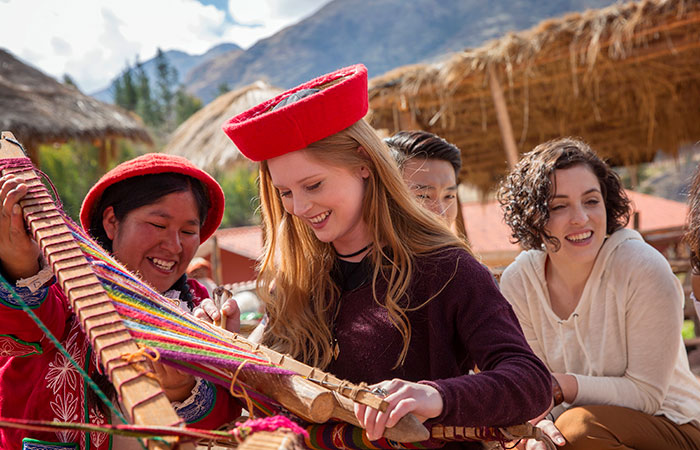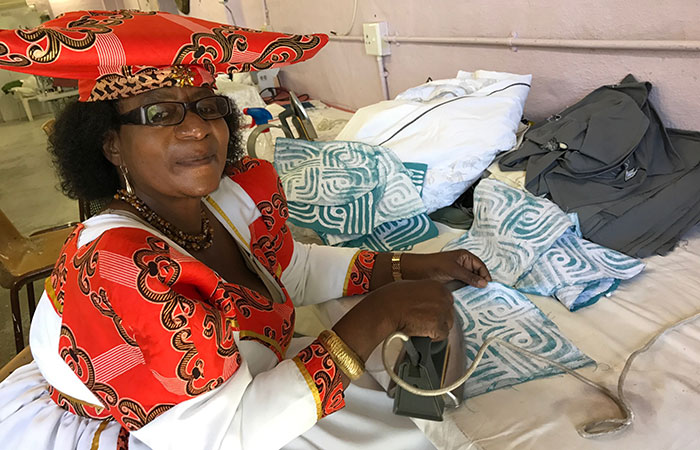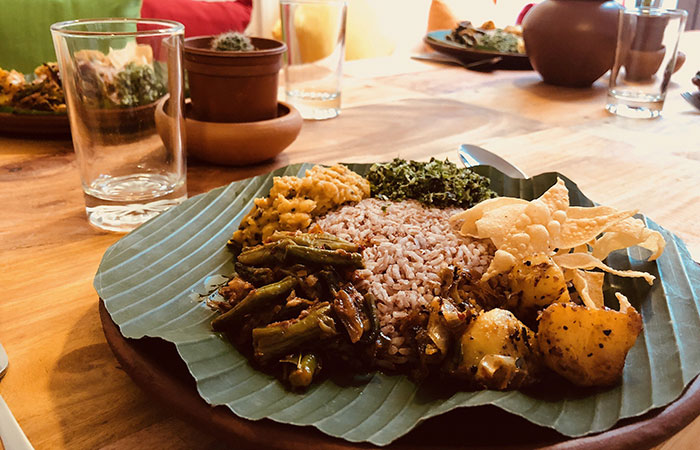
Adrienne Lee. All photos courtesy of G Adventures.
There’s no doubt about it. Travel changes people. From a life-altering vacation, to making travel a part of your career, travel and tourism has a way of connecting people to people, the earth and to animals in a way that nothing else can. And it also happens to have some of the biggest impacts on women all around the world. Whether it’s a local artisan who sells her crafts to tourists, or a traveller who embarks on a solo female adventure, women and travel go hand-in-hand.
Which is why we were incredibly excited to get Adrienne Lee of Planeterra’s thoughts on women and travel today. Planeterra was founded in 2003 by G Adventures’ founder, Bruce Poon Tip. It’s a non-profit organization that connects that huge tourism marketplace to local enterprises in destinations around the globe… all of which involve a whole lot of women, and makes your travels more fulfilling.
How does tourism directly impact the empowerment of women?
AL: Tourism can have many direct and indirect opportunities for opening doors for women and reducing the gender inequality gap.
Directly, tourism creates opportunities, resources, jobs and livelihoods. It is one of the few industries that can convert homegrown transferable skills to ones that can be utilized in the formal economy. For example, from cooking a meal to becoming a chef.
Indirectly, tourism can also alleviate some of the challenging burdens that are too often delegated to women in society. In many emerging economies, it’s often women that are in charge or acquiring their household’s water, fuel, and food. With developing tourism infrastructure for travellers, resources such as water tanks and electrical grids installed to support tourists, can also support local communities’ infrastructure.

Weaving in the Sacred Valley of Peru. All photos courtesy of G Adventures.
How can tourism help contribute to gender equality?
AL: For one, it creates a platform for women to access education and training opportunities for those that may not have benefited from a formal education growing up. Tourism creates meaningful jobs and enhances income, and can often be seen as an entry into the formal economy. Creating meaningful and engaging livelihoods also enhances income and independence for women. Women earning an income have a greater agency and position to determine how it is spent, strengthens decision making powers, and builds self-esteem.
What are some vital roles in tourism that women can be a part of?
AL: Tourism is an industry that has a low-barrier to entry, and employs more women and minority groups than any other industry. It’s one of few industries that is able to foster home-grown initiatives and convert these into formal livelihood opportunities.
Tourism can provide an entry-way into the formal economy, opportunities to stay and work within one’s own rural community, or the chance to move and apply your hospitality skills in other regions. Tourism creates jobs at all levels of management, and it is an industry where you can still thrive by being entrepreneurial and without necessarily needing a higher level of formal education.

Local arts in Namibia. All photos courtesy of G Adventures.
How are some ways that Planeterra is helping to empower women around the world?
AL: Through working with Planeterra, I’ve had a chance to see many lives of women change through tourism and in some cases, saved.
Planeterra’s first women-led program in Peru, the Ccaccaccollo Women’s Weaving Workshop is now entering its 12th year of partnership with us. Over the past decade, we’ve observed these women’s lives change, and the lives of their children.
Our partners in Tanzania, the Maasai Stoves & Solar Project, are utilizing tourism daily to support and install life-saving clean cookstoves across the Rift Valley. The female stove engineers share with G Adventures travellers the mechanics of a clean cookstoves, and what their homes would be like with and without this locally-engineered technology.
More recently we’ve launched a few new partnerships supporting women-run programs in Sri Lanka and Namibia. In Kandy, Sri Lanka, we’ve partnered with the Women’s Development Centre, to renovate and expand a training café and craft shop that employs female entrepreneurs in the region. The proceeds from their co-developed lunch program with Planeterra, is anticipated to be visited by 3,000 G Adventures travellers this year alone. The proceeds from this meal service will support a shelter for abused women and other training and empowerment programs run by our partners.
Planeterra launched the 50 in 5 Campaign in January 2016 with the aim to raise CAD $5 Million in order to integrate 50 new social enterprise projects into G Adventures trip in 5 years, changing the lives of local people in over 35 countries by providing them with the access to the benefits of tourism. The goal of this program is to raise the human capital of marginalized women, at-risk youth, and vulnerable populations.
With almost two and a half years into the campaign, we’ve partnered, invested and integrated 25 new partnerships into tours that are supporting the livelihoods of over 1,500 women worldwide. There are plans to bring on more female-lead programs, for the latest, subscribe to our quarterly updates here: https://planeterra.org/

Local eats at Kandy in Sri Lanka. All photos courtesy of G Adventures.
What are your top three tips to give a young woman who hasn’t travelled much yet, but wants to see the world?
- Always do your research beforehand.
- If you aren’t completely comfortable travelling alone, consider travelling with a reputable tour operator that employs local people. Having lived abroad for a number of years, in a country where I did not speak the local language, the culture shock can become overwhelming and leaning on friends who know the lay of the land was vital. Travelling with someone that knows the landscape will also give you the “insiders-scoop” of the destination you are travelling to.
- Travel light. I almost always travel with a carry-on bag only (you read that right!). Most things you might “forget” can be purchased locally, and will help drive economic investment in the places you’ll go.
How has travel changed you as a woman?
AL: Travel has changed me by not only opening my mind, but opening my heart. It has made me a more patient person, a listener, and an interpreter for deciphering local customs and language. It also continuously allows me to see the greater good in humanity, and the kindness of strangers that I hope to pay forward in everyday I live, either home or abroad!
More From Travel & Style
5 Reasons to Carry-On Your Luggage
5 Tips for First Time Cruisers
Who and How Much to Tip at Hotels

